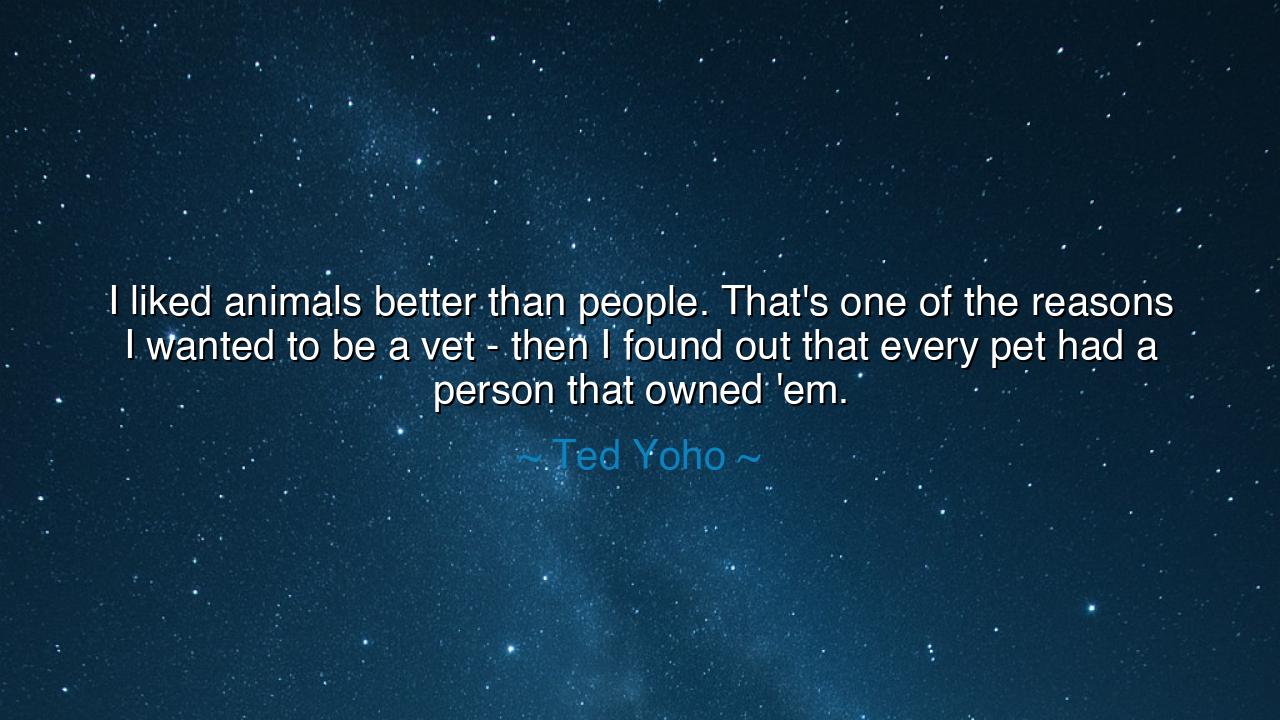
I liked animals better than people. That's one of the reasons I
I liked animals better than people. That's one of the reasons I wanted to be a vet - then I found out that every pet had a person that owned 'em.






Hear now the words of Ted Yoho, spoken with candor and humor: “I liked animals better than people. That’s one of the reasons I wanted to be a vet—then I found out that every pet had a person that owned ’em.” At first, these words may stir laughter, but beneath them lies a truth as old as mankind: that the creatures of the earth often reveal innocence and honesty where men reveal selfishness and deceit, and that even in choosing to serve the pure, one must reckon with the imperfections of those who hold dominion over them.
To love animals more than people is no strange sentiment. For the dog greets his master with loyalty unbroken by time or mood, the horse labors faithfully without guile, and the cat, though independent, deceives no one with false flattery. In contrast, men may betray, wound, and speak falsely. Thus, many hearts through the ages have sought solace in beasts, seeing in them the unvarnished face of nature. Yoho’s youthful desire to be a vet arose from this same longing: to devote his labor to creatures uncorrupted by the vices of man.
Yet, the revelation came: “every pet had a person.” In this realization lies the burden of responsibility. To care for the animal is to engage with its owner; to heal the dog is to instruct the man; to treat the cat is to console the family. Thus, the would-be healer of beasts discovers that the true challenge is not only in tending the innocent, but in guiding the flawed who govern them. And herein lies the deeper wisdom: one cannot escape humanity, even in the service of animals.
The ancients understood this paradox. Consider the story of St. Francis of Assisi, who loved animals as brothers and sisters, preaching to the birds and blessing the wolves. Yet even he did not love them apart from humanity, but as a bridge to humanity—reminding men that if they could honor the sparrow and the lamb, they must also learn to honor one another. In like manner, the vet may begin with devotion to beasts, but is called to face the greater labor: the healing of man’s relationship with his own stewardship.
History, too, gives us the tale of Xenophon, the soldier-philosopher who wrote of horsemanship. In his treatises, he praised the nobility of the horse, but taught also that the rider must be just, gentle, and wise, lest cruelty ruin both steed and man. Thus, the care of animals inevitably involves the education of their masters. Yoho’s humorous lament is but an echo of this ancient truth: in seeking to serve the blameless, we are forced to engage the flawed.
The lesson for us is clear: though we may prefer the innocence of animals, we cannot escape the bonds of human responsibility. To love the creature rightly, we must also labor with patience for the one who owns it. This is a parable of life itself: we may long to dwell in purity, but we are called to endure imperfection, to guide and instruct, to lift others even when they burden us. The true healer, the true lover of creation, does not shrink from this task.
Practically, this means: if you love pets, love also their people. Teach kindness, model patience, and show by your care how they too may treat their companions with honor. And more broadly, if you prefer simplicity over the messiness of human affairs, remember that life demands engagement. Do not flee from the flawed, but learn to bear with them, to shape them, and to heal them, even as you care for what is innocent.
Therefore, O seekers of wisdom, let us take Yoho’s words to heart. To love the animal is noble, but to endure the person is necessary. For the world is not divided; the beast and the man are bound together. And if we would truly honor creation, we must labor for both. Love the loyal dog, but guide the stumbling master; cherish the faithful horse, but teach the heavy-handed rider. In this way, we walk not only as lovers of animals, but as healers of the human spirit itself.






AAdministratorAdministrator
Welcome, honored guests. Please leave a comment, we will respond soon